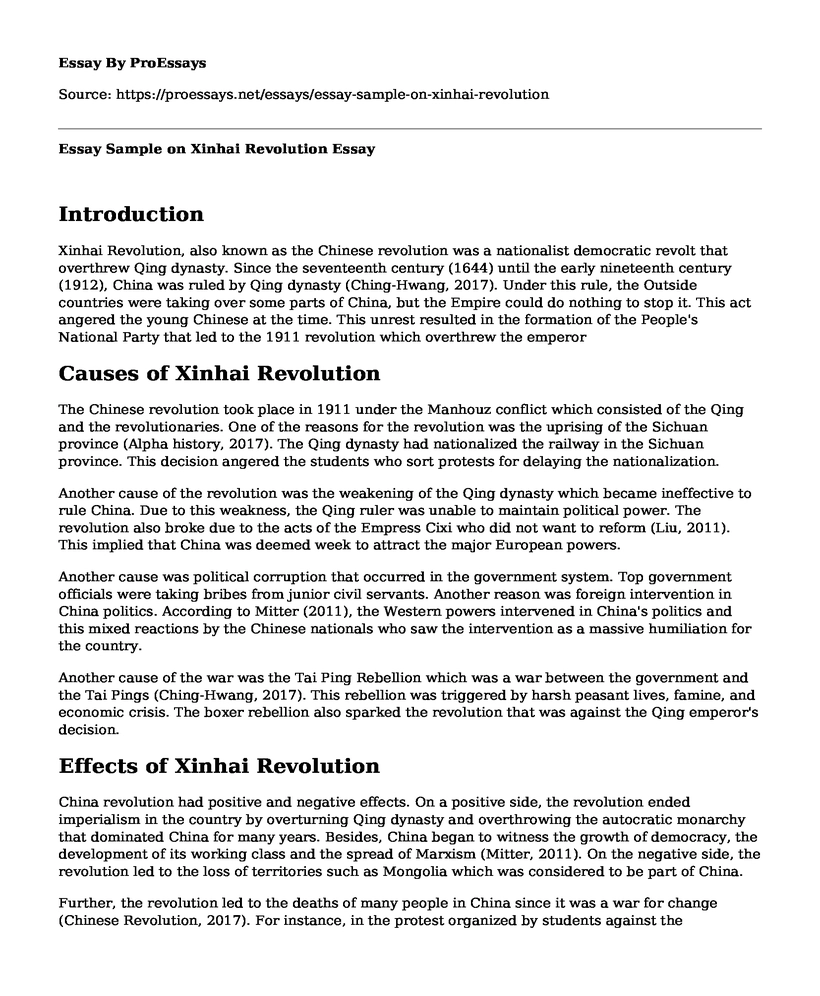Introduction
Xinhai Revolution, also known as the Chinese revolution was a nationalist democratic revolt that overthrew Qing dynasty. Since the seventeenth century (1644) until the early nineteenth century (1912), China was ruled by Qing dynasty (Ching-Hwang, 2017). Under this rule, the Outside countries were taking over some parts of China, but the Empire could do nothing to stop it. This act angered the young Chinese at the time. This unrest resulted in the formation of the People's National Party that led to the 1911 revolution which overthrew the emperor
Causes of Xinhai Revolution
The Chinese revolution took place in 1911 under the Manhouz conflict which consisted of the Qing and the revolutionaries. One of the reasons for the revolution was the uprising of the Sichuan province (Alpha history, 2017). The Qing dynasty had nationalized the railway in the Sichuan province. This decision angered the students who sort protests for delaying the nationalization.
Another cause of the revolution was the weakening of the Qing dynasty which became ineffective to rule China. Due to this weakness, the Qing ruler was unable to maintain political power. The revolution also broke due to the acts of the Empress Cixi who did not want to reform (Liu, 2011). This implied that China was deemed week to attract the major European powers.
Another cause was political corruption that occurred in the government system. Top government officials were taking bribes from junior civil servants. Another reason was foreign intervention in China politics. According to Mitter (2011), the Western powers intervened in China's politics and this mixed reactions by the Chinese nationals who saw the intervention as a massive humiliation for the country.
Another cause of the war was the Tai Ping Rebellion which was a war between the government and the Tai Pings (Ching-Hwang, 2017). This rebellion was triggered by harsh peasant lives, famine, and economic crisis. The boxer rebellion also sparked the revolution that was against the Qing emperor's decision.
Effects of Xinhai Revolution
China revolution had positive and negative effects. On a positive side, the revolution ended imperialism in the country by overturning Qing dynasty and overthrowing the autocratic monarchy that dominated China for many years. Besides, China began to witness the growth of democracy, the development of its working class and the spread of Marxism (Mitter, 2011). On the negative side, the revolution led to the loss of territories such as Mongolia which was considered to be part of China.
Further, the revolution led to the deaths of many people in China since it was a war for change (Chinese Revolution, 2017). For instance, in the protest organized by students against the nationalization of the railway in the Sichuan province, more than 32 students died. Many lives were also lost in other wars. Another adverse effect was the loss of property. A lot of property was being destroyed and looted during the war. Moreover, China revolution led to the outbreak of a brief civil war due to an argument about the next ruler.
Importance of the Xinhai Revolution
Xinhai Revolution brought positive changes in China. For instance, it made China embrace socialism by ending a monarchy that lasted for a long time. This act encouraged the Chinese to denounce imperialism (Alpha history, 2017). In other words, the revolution marked the beginning of freedom in China by ending hegemony. Another importance was the increase of foreign influence in the Chines cultures and introduction of new ideas. For instance, the revolution promoted the development of technology and led to the improvement of medical facilities (Liu, 2011). It also introduced western concepts of architecture, sculptures, paintings, and art in the Chinese culture. Without this revolution, China would have still been under the absolute monarch.
Conclusion
In sum, the Xinhai Revolution of 1911 promoted change in China by ending imperialism. Many factors including the uprising of the Sichuan province, weakening of the Qing dynasty, political corruption, Tai Ping Rebellion, and the Boxer rebellion facilitated this revolution. The positive impacts of the war were the growth of democracy and the spread of Marxism. The negative impacts included loss of were, destruction of property and loss of territories.
References
Alpha history. (2017). Retrieved December 9th, 2018, from https://alphahistory.com/chineserevolution/xinhai-1911-revolution/
Chinese Revolution. (2017). Retrieved December 9th, 2018, from https://chineserevolutioncausesandimpacts.weebly.com/impacts--consequences.html
Ching-Hwang, Y. (2017). The Overseas Chinese and the 1911 Revolution. The Chinese Diaspora in the Pacific. Abingdon: Routledge.
Liu, H. S. (2011). China in Revolution: The Road to 1911. Hong Kong: Hong Kong University Press.
Mitter, R. (2011). 1911: The Unanchored Chinese Revolution. The China Quarterly, 208(1), 1009-1020.
Cite this page
Essay Sample on Xinhai Revolution. (2022, Oct 19). Retrieved from https://proessays.net/essays/essay-sample-on-xinhai-revolution
If you are the original author of this essay and no longer wish to have it published on the ProEssays website, please click below to request its removal:
- Mental and Mental Health Nurse Practitioner in Texas Paper Example
- Essay Sample on Government Business Protection
- Establishing Property Rights in Qing's China: From Wasteland to Cultivation - Essay Sample
- Essay Example on Affording Higher Education in the USA: A Financial Challenge
- Essay Example on American History X: Racism in America's Colorblind Society
- Essay Example on Confucianism: A Vital Force in Arising China's Social Structures
- Essay Sample on Fiscal Policy: Governments' Tool to Influence Economic Activity







